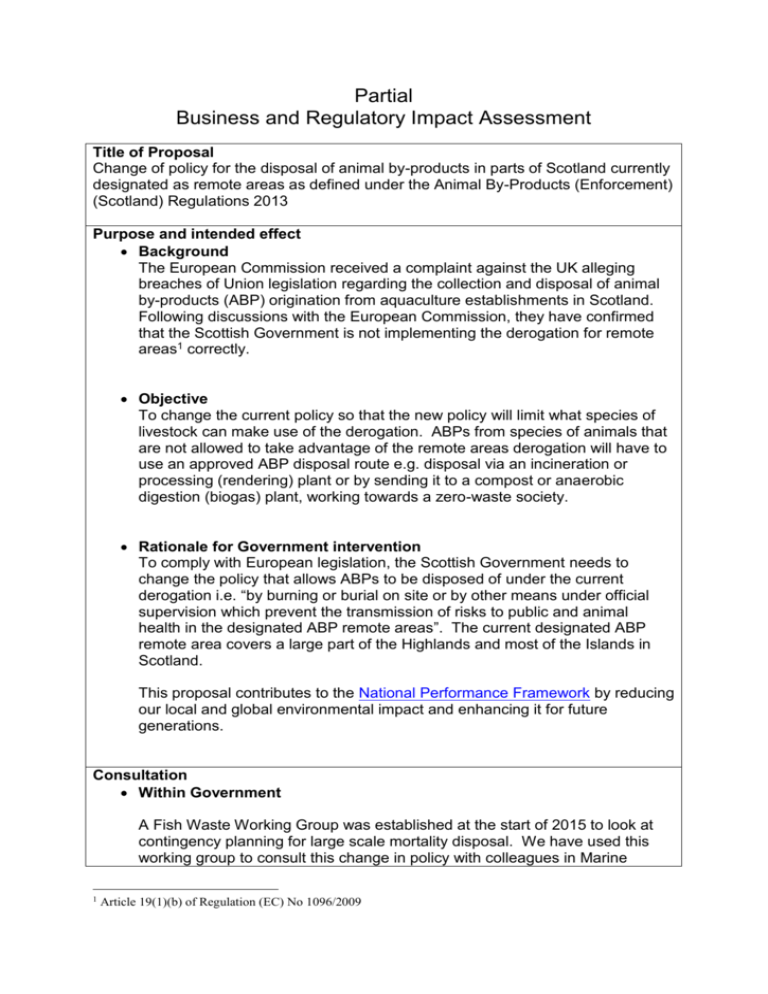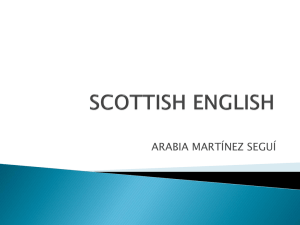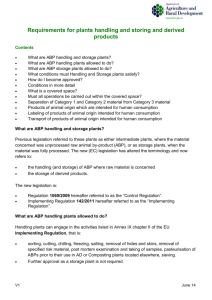Regulatory Impact Assessment Template
advertisement

Partial Business and Regulatory Impact Assessment Title of Proposal Change of policy for the disposal of animal by-products in parts of Scotland currently designated as remote areas as defined under the Animal By-Products (Enforcement) (Scotland) Regulations 2013 Purpose and intended effect Background The European Commission received a complaint against the UK alleging breaches of Union legislation regarding the collection and disposal of animal by-products (ABP) origination from aquaculture establishments in Scotland. Following discussions with the European Commission, they have confirmed that the Scottish Government is not implementing the derogation for remote areas1 correctly. Objective To change the current policy so that the new policy will limit what species of livestock can make use of the derogation. ABPs from species of animals that are not allowed to take advantage of the remote areas derogation will have to use an approved ABP disposal route e.g. disposal via an incineration or processing (rendering) plant or by sending it to a compost or anaerobic digestion (biogas) plant, working towards a zero-waste society. Rationale for Government intervention To comply with European legislation, the Scottish Government needs to change the policy that allows ABPs to be disposed of under the current derogation i.e. “by burning or burial on site or by other means under official supervision which prevent the transmission of risks to public and animal health in the designated ABP remote areas”. The current designated ABP remote area covers a large part of the Highlands and most of the Islands in Scotland. This proposal contributes to the National Performance Framework by reducing our local and global environmental impact and enhancing it for future generations. Consultation Within Government A Fish Waste Working Group was established at the start of 2015 to look at contingency planning for large scale mortality disposal. We have used this working group to consult this change in policy with colleagues in Marine 1 Article 19(1)(b) of Regulation (EC) No 1096/2009 Scotland, the Fish Health Inspectorate, Cefas, Scottish Environment Protection Agency (SEPA), Zero Waste Scotland, Defra, Department of Agriculture and Rural Development (DARD), the Welsh Government and the Animal and Plant Health Agency (APHA). Public Consultation A formal consultation on these Regulations will take place from 17 August to 18 September. Business We contacted stakeholders in May to notify them about the change in policy and inform them that a formal consultation would follow in the summer. This proposal has also been conveyed to industry representatives through the Fish Waste Working Group. The Scottish Salmon Producers Organisation and the British Trout Association are members of the working group. We are also funding a project via Zero Waste Scotland (Scottish Fish Farm Waste Reprocessing Options – Scoping Study) to look at Scottish fish farm waste and identify current waste disposal routes, suitable alternative ABP complaint disposal routes and the existing waste capacity in Scotland. Options Option 1 - Status quo Option 2 – Amend the Animal By-Products (Enforcement) (Scotland) Regulations 2013 (ABPR) so remote areas derogation applies to terrestrial livestock animals only Option 3 - Amend ABPR so remote areas derogation applies to terrestrial and aquatic animals Outline of available options Option 1 - Status quo This is not a viable option; the status quo means that Scotland is in breach of the EU ABP legislation. As drafted, regulation 8 of the ABPR defines the areas of Scotland that are categorised as remote areas. The areas are defined by either the local council area or the parish name and number. Option 2 - Amend ABPR so remote areas derogation applies to terrestrial livestock animals only This option would see an amendment to regulation 8 of the ABPR so that terrestrial livestock animals would be the only species of animals that are able to take advantage of the ABP remote areas derogation. Option 3 - Amend ABPR so remote areas derogation applies to terrestrial and aquatic animals This option would take Option 2 and expand it to include aquatic livestock animals. We would need to amend regulation 8 of the ABPR to specify what species of terrestrial livestock and aquatic animals would be able to take advantage of the ABP remote areas derogation. Sectors and groups affected The following sectors are likely to be affected by the proposals: Fish farms located within the ABP remote area Shellfish farm located within the ABP remote area Landfill sites Fish waste hauliers/transporters Benefits Options 1 and 3 would see no significant change to current disposal practices. Under Option 2: Fish and shellfish farms located within the ABP remote area will need to use an approved ABP disposal route e.g. disposal via an incineration or processing (rendering) plant or by sending it to a compost or anaerobic digestion (biogas) plant. They can no longer send their waste to a landfill site for disposal. Landfill sites that currently accept fish waste from fish or shellfish farms will lose any potential revenue from no longer accepting this type of waste. Local transporters delivering fish waste to landfill sites will no longer take place but the fish waste will still need to be transported to an approved ABP disposal site. There would be no infraction risk for Options 2 and 3 as they would fully implement the EU ABP legislation Costs Failing to correctly apply EU legislation into domestic legislation puts the UK at risk of the European Commission starting formal infringement against us if we do not amend the ABPR. The minimum cost of infraction to the Scottish Government could be a €9,666,000 lump sum and possible daily substantial fines of thousands of pounds for continued non-compliance. As part of the consultation process we will be asking businesses if the envisage any additional costs being placed on their business as a result of having to change the way they collect, transport or dispose of fish farm mortalities. We will also be trying to assess any potential costs through the Scottish Fish Farm Waste Reprocessing Options – Scoping Study. A detailed assessment of all costs (additional and savings) will be available in the final Business and Regulatory Impact Assessment. Scottish Firms Impact Test We are in consultation with the Scottish Salmon Producers Organisation and the British Trout Association through the Fish Waste Working Group. The consultation will be sent to individual fish farm producers and organisations in the ABP sector. The Scottish Fish Farm Waste Reprocessing Options – Scoping Study will consult with key contacts in the aquaculture sector in Scotland to discuss the detailed makeup and component parts of the ABP waste stream and any technical challenges that may arise from its transportation, collection and disposal. This section will be updated with the results of these discussions in the final Business and Regulatory Impact Assessment. Competition Assessment Using the Competition and Markets Authority Competition Filter questions we have concluded that the proposals will neither directly or indirectly limit the number or range of suppliers, limit the ability of suppliers to compete or reduce suppliers' incentives to compete vigorously. Test run of business forms There will be no specific business forms involved with the implementation of the proposed legislation. Legal Aid Impact Test The proposal is unlikely to have an impact on the legal aid fund. Enforcement, sanctions and monitoring Responsibility for compliance, monitoring and enforcement of the provisions are: APHA only inspect fish farms that have ABP approved incinerators on site. Enforcement of the ABPR is carried out by the local authorities. Environmental controls are enforced by SEPA. The Fish Health Inspectorate carries out inspection and testing of fish and shellfish farms to prevent the introduction and spread of serious fish and shellfish diseases in Scotland. Marine Scotland carries out annual surveys of fish farming industries, provide statistics and evaluate the production of aquaculture species in Scotland. Implementation and delivery plan The proposal will be implemented in legislation via an amendment to the Animal ByProducts (Enforcement) (Scotland) Regulations 2013. This amendment will come into force on 1 January 2016. Post-implementation review The Scottish Government are required to monitor regularly the areas categorised as ABP remote areas to ensure that those areas and the disposal operations are properly controlled. Summary and recommendation Option 2 is being recommended. This option fully implements the EU ABP legislation. The bovine, ovine and caprine animal populations in the derogated remote areas falls well below the maximum percentages set in the EU ABP legislation. The animal populations for other terrestrial livestock are also extremely low in comparison to those populations in the rest of the UK. For option 3 to be successful, an assessment would need to be submitted to the European Commission that specifically looks at aquaculture activities in the derogated ABP remote areas. Apart from freshwater production of rainbow and brown trout, almost all of aquaculture industry in Scotland takes place within the currently derogated remote area. It seems very unlikely that we would be able to successfully argue with the European Commission that these species of aquatic animals can take advantage of the ABP remote areas derogation. A summary costs and benefits table will be included in the final Business and Regulatory Impact Assessment. Declaration and publication Sign-off for Partial BRIAs: I have read the Business and Regulatory Impact Assessment and I am satisfied that, given the available evidence, it represents a reasonable view of the likely costs, benefits and impact of the leading options. I am satisfied that business impact has been assessed with the support of businesses in Scotland. Signed: Date: Richard Lochhead Cabinet Secretary for Rural Affairs, Food and the Environment Scottish Government Contact point: Ian Murdoch Animal Health and Welfare Division Directorate for Agriculture, Food and Rural Communities The Scottish Government P Spur, Saughton House Broomhouse Drive Edinburgh, EH11 3XD Tel: 0300 244 9833 Fax: 0300 244 9797 Email: ian.murdoch@scotland.gsi.gov.uk







